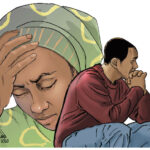I don’t recall when exactly, but I came across a video on social media of a man who seemed ready to jump from a bridge to his death in Lagos. Below, a crowd gathered, begging him not to jump (not then, not ever) while some folks on the bridge successfully intervened to save him from self-inflicted death.
That incident reminded me of how communal our Naija society is, of the kindness of strangers, but also of the need for us to take mental health wellness seriously because even though many of us (I hope) would stop and help a fellow Nigerian in a crisis, like the man who was stopped from killing himself, conversations around mental health and mental well-being often reveal a regrettable lack of understanding.
There were people who said of the man who wanted to jump off the bridge that he wasn’t serious. They said if he had wanted to kill himself, he wouldn’t have come to do it in public but would have done it in the privacy of his own home.
There are those who think that anyone who tries to kill themselves is ungrateful/foolish/attention seeking and so on, and who said that had they been there, they would have asked the man to jump. Some said it was because the man was poor/hungry that he’d wanted to kill himself. Economy hard.
Make food available, affordable
Between the sisters-raping teacher of Gombe and the vulnerability of minors
Unfortunately, mental health illness works like other illnesses: it’s the luck of the draw. It doesn’t matter what you have (or don’t have), you can fall prey to depression, for example, and the dark tunnels it takes one through. Anthony Bourdain was at top of his career, he wasn’t suffering from Naija economy and yet he killed himself. Same for the super successful actor, Robbie Williams. He could afford whatever it was he wanted, yet he succumbed to the voice in his head that told him he didn’t deserve to live.
Last year, a 76-year-old Grammy-winning country music star, Naomi Judd, shot and killed herself two days before she and her singer-daughter were to be inducted into the Hall of Fame.
Depression isn’t an illness that the wealthy are immune from. Like rain, it falls on the poor and rich alike; the young and the old, man and woman. And like rain, there are variations of it: anxiety disorders, depression, PTSD, bipolar disorders, schizophrenia, disruptive behaviour and dissocial disorders, neurodevelopmental disorders, eating disorders.
The 10th of October is World Mental Health Day and this year’s theme was ‘Mental health is a universal human right.’ So this week is as good a time as any to raise awareness, as well as remind us that we all have a right to good mental health. And that right, like the WHO states, “includes the right to be protected from mental health risks, the right to accessible, acceptable, and good quality care, and the right to liberty, independence and inclusion in the community.”
People with mental health conditions should not be made pariahs of. I remember reading the story of a 25-year-old man in Lagos, likely suffering from schizophrenia, who was taken to a babalawo for treatment. He was chained like a dog, and when the family could no longer afford the pay the babalawo’s fees, his treatment stopped and he was unchained. His family said it was his “fate” to be mad and so he is now one of the “mad” who roam the streets of Lagos, scavenging for food. His family spokesperson admitted that they were ashamed of him, even though they believed that his madness was brought on by “a spiritual attack.”
No one would say they were ashamed of family members with cancer or diabetes or any other serious illness, and yet the reality is that rather than sympathy, there is shame for those suffering from serious mental health illness. And rather than seek treatment in hospital (to complement whatever religious help is being sought), they are sometimes left at the mercy of people who could very well be charlatans.
We must begin to think of/talk about mental health illness differently. Like every other illness, sufferers do not deserve our scorn but our compassion. If there is anyone suffering in your family, please ensure that they are getting the help they need. Advocate for them. If you suspect that your mental health isn’t great, you owe it to yourself to seek help too.
Let us work towards the de-stigmatization of mental illness, a better understanding of it, and for the mental well-being of all of us.

 Join Daily Trust WhatsApp Community For Quick Access To News and Happenings Around You.
Join Daily Trust WhatsApp Community For Quick Access To News and Happenings Around You.


